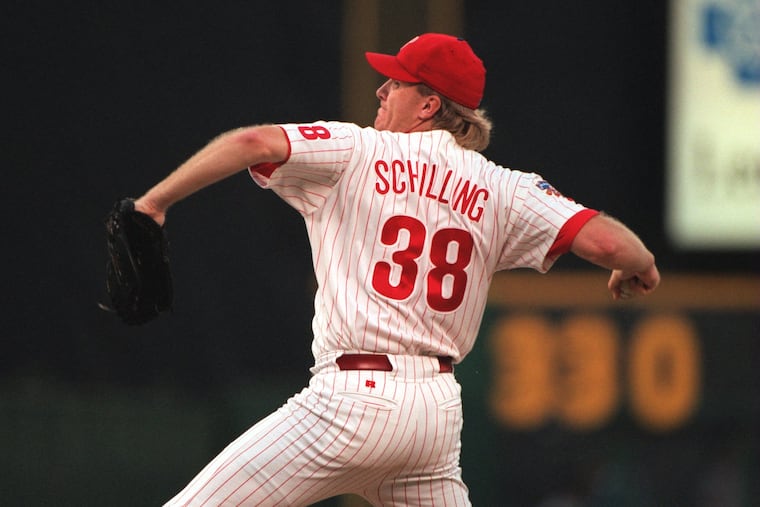From Curt Schilling and politics to David Ortiz and PEDs: Baseball writers can’t win as Hall of Fame voters | David Murphy
On Wednesday afternoon, the writers spoke: It is better to be rumored a cheater than established a jerk.

Every industry has its unwritten rules. In the service world, you don’t question the customer. In the business world, you don’t dress above your position. In the pool- hustling world, you don’t mess around with Jim. And in the world of sports writing, you don’t become the story.
I’d ask you to keep that last maxim in mind as we consider the latest edition of the annual firing squad that the industry circles together each winter. First, a quick refresher. For the last 86 years, the Baseball Hall of Fame has delegated its induction decisions to veteran members of the Baseball Writers Association of America. The electorate consists of about 400 current and former scribes, each of whom selects up to 10 eligible candidates. Players must receive 75% of the eligible votes for induction. Once the inductees are announced, the voters return to their regularly-scheduled duties and proceed to write about the induction.
As if anybody needed a reminder of the moral and ethical tightrope that participants in the process must walk, this year brought with it a couple of former Red Sox to illuminate baseball writing’s hardest philosophical problem.
Here, on one line, was David Ortiz, round and proud with a smile that burned brighter than any of his 541 home runs. In another era, you wouldn’t have even needed to think. He had the requisite number of dingers, and more than enough rings. But this was the post-steroid era, and there was a pesky little matter. The electorate had largely shunned players who had been implicated in PED use, and Ortiz had reportedly failed a PED test back in 2003.
Over there, on another line, smack dab in the middle of third and final column, was Ortiz’s former teammate, one of the primary contributors to two of his three World Series rings. Like Ortiz, even more so, there should have been little doubt about the legitimacy of Curt Schilling’s resume. Even if you ignored the advanced metrics that called him one of the 30 best starters of all time, his two World Series MVPs and 2.23 postseason ERA are the sorts of traditional benchmarks that warrant automatic inclusion. Except, his one blot was a big one. People don’t especially like him.
On Wednesday afternoon, the writers again spoke. It is better to be rumored a cheater than established a jerk. And even baseball’s home run king can’t overcome both.
Set aside the questions about the logical consistency of these ever-evolving guidelines. Forget the question of whether Schilling’s outspoken right-wing viewpoints should warrant consideration in a baseball matter, or whether an exhibit of the greatest baseball players of all time can really be complete without Barry Bonds. The biggest question raised by this year’s voting is one that the voters must ask themselves: How long can writers ignore the fact that they are now covering a story that they’ve created?
» READ MORE: Logan O’Hoppe has always been a catcher, and that won’t change with the Phillies
Granted, it’s a question that has been asked since at least 2013, when the Baseball Writers Association of America failed to select a single player for induction. Back then, it was easy to slink out of the public crosshairs and kick the can down the curb. The focus of each subsequent year’s results was largely on the players. Greg Maddux, Pedro Martinez, Ken Griffey Jr., Derek Jeter, Roy Halladay — these were the big stories, one of them tragically so.
All of a sudden, there is no more curb: just a single, flawed DH. The greatest modern day hitter? He’s gone from the ballot. One of its most dominant pitchers? His vote total went backward. The voters? They’re still writers, and they’re a big part of the story.
That’s an inconvenient enough truth that few voters will even quibble. The response is usually Churchillian in nature: The system isn’t great, but it’s better than all the others. Most years, that’s enough to any cognitive dissonance. This year, though, the reality is plain as day: The BBWAA is effectively setting policy for the sport it must critically cover. Some PED offenses are unforgivable. Others are grandfathered in. Only a certain level of greatness can overcome a Crazy Uncle worldview.
» READ MORE: David Ortiz elected to Hall of Fame; Barry Bonds, Roger Clemens, Curt Schilling denied in final ballot bid
The best evidence that baseball writers should not bear the responsibility of making these distinctions is the fact that baseball itself refuses to make them. Rob Manfred said all he should have needed to say back in 2016 when he said that voters were the ones responsible for deciding on PED disqualification.
“That’s a policy decision,” the MLB commissioner said. “[The writers] have got to look into their conscience and decide how they evaluate that against the Hall of Fame criteria.”
Except, this is not the writers’ Hall of Fame. It belongs to baseball. That might have been a difference without distinction in simpler times, but these times are … well … you see them. It’s why the Ortiz-Schilling dichotomy is more foreboding than any concerning Bonds. It doesn’t matter whether Schilling’s performance at the polls this year was a matter of politics. If it was, it doesn’t matter whether it was in the interest of the greater good. What matters is perception. And the more people perceive you to be part of the story, the less they trust you to tell it.